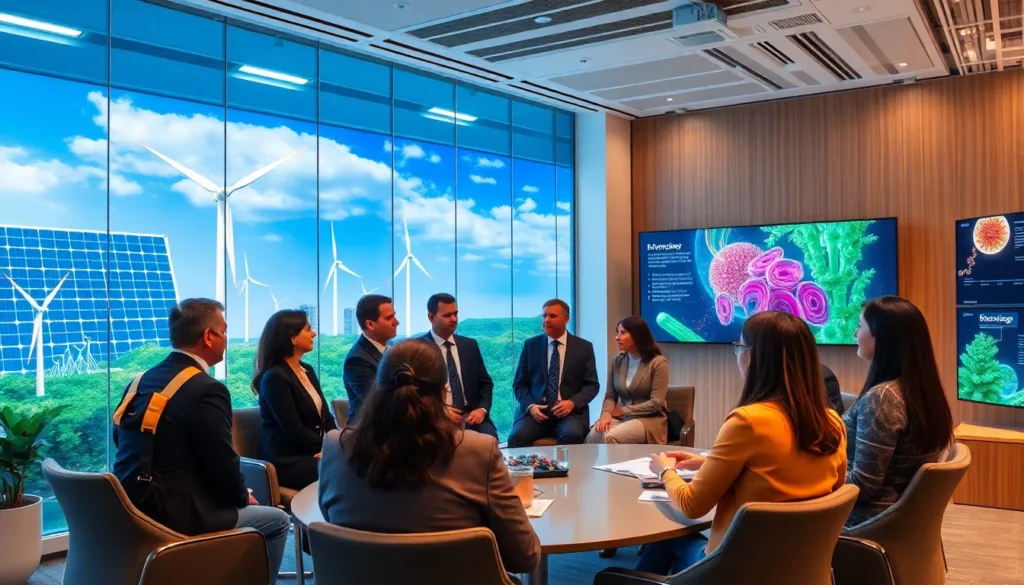In a world where smartphones practically run our lives and robots are starting to take over the dance floor, understanding emerging technologies is more crucial than ever. These innovations aren’t just buzzwords tossed around at tech conferences; they’re the game-changers shaping our future. From artificial intelligence to blockchain, these trends are like the cool kids in school—everyone wants to know them, and they’re definitely worth the hype.
Table of Contents
ToggleUnderstanding Emerging Technologies
Emerging technologies represent cutting-edge advancements reshaping various industries. Their influence extends beyond mere trends, indicating a fundamental shift in how society functions.
Definition of Emerging Technologies
Emerging technologies refer to innovations that are currently developing or will be available in the near future. These technologies often involve novel concepts and methods that challenge existing paradigms. Examples include artificial intelligence, quantum computing, and nanotechnology. Their impact on industries like healthcare, finance, and transportation is substantial, driving efficiency and creating new opportunities.
Characteristics of Emerging Technologies
Emerging technologies share several key characteristics. Rapid development often typifies them, with progress occurring at unprecedented speeds. Disruption in traditional markets frequently results from their introduction. Scalability allows these technologies to adapt to various applications. They tend to invoke significant societal changes, prompting shifts in job markets and lifestyles. Lastly, these technologies often require interdisciplinary collaboration, merging perspectives from different fields like engineering, social sciences, and information technology.
Categories of Emerging Technologies

Emerging technologies span various categories, each redefining industries and influencing everyday life.
Information Technology
Information technology encompasses advancements in computing and communication. Artificial intelligence, big data analytics, and blockchain technology exemplify significant innovations. AI enhances decision-making processes, while big data analytics drives insights across multiple sectors. Blockchain ensures security and transparency in transactions, especially in finance. Cloud computing offers scalable resources, making data storage and application more accessible. These developments not only increase efficiency but also foster new business models.
Biotechnology
Biotechnology is revolutionizing fields such as medicine and agriculture. Genetic engineering and CRISPR technology lead the way in altering organisms for better health outcomes. Biopharmaceuticals, derived from biological sources, are key in developing targeted therapies for diseases. Advances in personalized medicine allow treatments tailored to individual genetic profiles. Agricultural biotechnology improves crop yields and pest resistance, contributing to food security. These innovations tackle critical challenges like health crises and climate change.
Renewable Energy Technologies
Renewable energy technologies focus on sustainable solutions for energy production. Solar, wind, and hydropower represent major sources of clean energy. Solar panels harness sunlight for electricity generation, while wind turbines convert kinetic energy from wind. These technologies reduce dependence on fossil fuels, lowering greenhouse gas emissions. Energy storage systems, such as batteries, enable efficient use of renewable resources. The shift to renewables not only addresses environmental issues but also creates jobs in the green economy.
The Impact of Emerging Technologies
Emerging technologies have far-reaching effects on various aspects of society and the economy. As these innovations progress, they create new opportunities alongside challenges that require careful consideration.
Economic Implications
Economic growth often accelerates due to emerging technologies. Enhanced production processes lead to increased efficiency and reduced costs. Job markets undergo transformation as traditional roles evolve or become obsolete. For instance, automation in manufacturing improves productivity but may displace certain workers. New job categories arise, necessitating reskilling. Startups flourish in technology sectors, driving competition and innovation. Regulations may lag behind these advancements, requiring policymakers to adapt. Investments in research and development become critical for sustaining this economic momentum.
Social and Ethical Considerations
Social structures face significant shifts with the rise of emerging technologies. Data privacy concerns intensify as individuals share more information online. Ethical dilemmas also emerge, particularly in artificial intelligence use and surveillance practices. Equality issues arise when access to technologies differs among socioeconomic groups. Communities may experience disparities in resource allocation due to technological advancements. Stakeholder engagement becomes essential for ensuring equitable outcomes. Collaboration among technology developers, ethicists, and policymakers can support responsible innovation. Thoughtful consideration of social implications shapes a fairer integration of these technologies.
Challenges in Defining Emerging Technologies
Defining emerging technologies poses various challenges due to the rapid pace of innovation and evolving nature of these advancements.
Rapid Evolution
Technologies can change overnight, complicating definitions. New findings in fields like artificial intelligence and biotechnology frequently alter what constitutes “emerging.” Understanding varies among industries, as what’s innovative for one sector may be considered mainstream for another. Fast development cycles create ambiguity, making it difficult to pinpoint technologies that truly fit the emerging category. As a result, establishing consistent benchmarks for evaluation proves challenging. Staying updated with trends requires continuous monitoring, which adds another layer of complexity. Stakeholders often rely on real-time data to assess the relevancy of technologies, reinforcing the need for agile definitions.
Regulatory and Policy Issues
Regulatory frameworks struggle to keep pace with technological advancements. Existing policies often fail to accommodate the unique characteristics of emerging technologies. Enforcement of outdated regulations can hinder innovation, creating a gap between technology and governance. Policymakers face challenges in establishing guidelines while ensuring public safety and privacy. Diverse perspectives complicate consensus, leading to fragmented approaches across jurisdictions. Clarity in regulations is essential for nurturing innovation without compromising ethical standards. Collaboration among industry leaders, regulators, and researchers will bridge these gaps, facilitating clearer definitions and smoother implementation.
Emerging technologies are redefining the landscape of modern society. Their influence spans across various sectors and touches everyday life in profound ways. As these innovations continue to evolve they bring both opportunities and challenges that require careful navigation.
The need for collaboration among stakeholders is crucial in ensuring responsible development. Addressing ethical considerations and regulatory frameworks will be vital as these technologies advance. Understanding and adapting to these changes will empower individuals and organizations to thrive in an increasingly tech-driven world.


